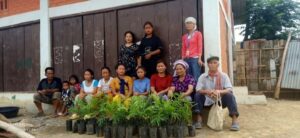Sustainable Farming

In our Manipur hubs in the North East, we have a farmer produce group (FPG) that creates awareness among farmers on the sustainable methods of farming. Lhingjahoi and Mangjalal are farmers who have been a part of our FPG and they tell us what they have learnt and implemented on their lands.
“As a farmer, we have an indigenous knowledge about farming, but we have always used synthetic fertilisers to fertilise our soil. We were clueless when the soil was not hardened, losing its fertility and becoming easily dry even when we put in fertiliser every year. Despite the sloppiness of the land (muddy and wet), there was no water retention after rain, and the land dries up quickly.
Only after attending the Oasis India’s Sloping Agriculture Land Technology* and Indigenous Micro-Organism (IMO)* training did I begin to have a clear understanding that soil’s fertility can be maintained through the usage of IMO. I learnt how to implement SALT which is a necessity for sustainable farming, and this was very helpful for us. I strongly believe that the knowledge we’ve gained would help us to take care of our land, be more productive, and lead a successful farming life.”
We currently have over 50 farmers from Songpi, Teiseng and Tuinom villages who are part of the Farmer Produce Group. These members from three villages have monthly meetings for training and discussions.
*SALT training is a technology used to sustain fertility and reduce erosion of soil in cultivated inclined lands. It is a form of alley farming in which crops are grown in four to five metre wide columns between rows of leguminous trees.
*IMO is the usage of bacteria, fungi, nematodes, and protozoa, etc., in place of inorganic fertilisers to produce fertile soil.
